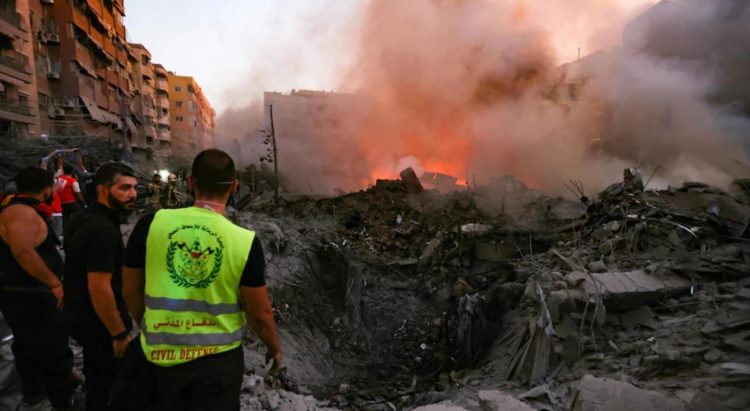Nasrallah Assassinated in Israeli Airstrike: A Turning Point in the Israel-Hezbollah Conflict
On September 27, 2024, Hezbollah Secretary-General Hassan Nasrallah (حسن نصر الله) was killed in an Israeli airstrike targeting a command center in southern Beirut. The strike was part of a broader campaign by Israel against Hezbollah, which has been intensifying over the past year. This assassination is being seen as one of the most significant developments in the ongoing Israel-Hezbollah conflict since the 2006 Lebanon War.
The airstrike, which utilized U.S.-made bunker-buster bombs, targeted a heavily fortified underground facility in the Haret Hreik neighborhood of the Dahieh suburbs of Beirut. The precision strike killed several senior Hezbollah commanders alongside Nasrallah, including Ali Karki, the commander of Hezbollah’s Southern Front. The attack targeted a command facility reportedly embedded under a residential building. It reduced six apartment buildings to rubble and caused several craters in the immediate area.
According to the Lebanese Health Ministry, the Israeli airstrike killed at least six individuals and caused more than ninety-one additional casualties. That number is expected to rise as there are still people trapped under the rubble. Representatives of the Israel Defense Forces (IDF) state that they conducted the raid during daylight hours to minimize civilian casualties in the densely populated area.
Nasrallah had been the leader of Hezbollah since 1992 and had transformed the group into a powerful political and military force in the region. He came to power following the assassination of his predecessor, Abbas al-Musawi, in an Israeli airstrike. During his rule Hezbollah was able to acquire weapons with a longer range. Weapons capable of striking northern Israel. Hezbollah’s popularity in Lebanon grew following Israel’s 2000 withdrawal from the southern region of the country following eighteen years of occupation.
Israel’s military confirmed Nasrallah’s death, while Hezbollah initially delayed official confirmation. However, by September 28, Hezbollah released a statement acknowledging that their long-standing leader had been killed and, according to them, “has joined his fellow martyrs.” Initially, a Hezbollah spokesman told the press that Nasrallah was not in the targeted buildings and that he was “fine.”
The loss of Nasrallah is expected to have wide-reaching implications for both Hezbollah and Lebanon, potentially destabilizing the region further as Hezbollah has already promised retaliation. Following the strike, Hezbollah continued to launch missiles into northern Israel.
Israel’s Chief of Staff, Lieutenant General Herzi Halevi, stated that Nasrallah’s death demonstrated Israel’s ability to reach anyone who threatens its citizens. The continued with military operations, launching several more strikes into southern Beirut and the Bekaa Valley on Saturday morning.
Nasrallah was a central figure in the Iran-backed “Axis of Resistance” for over 30 years. His leadership marked Hezbollah’s involvement in numerous conflicts with Israel, as well as its deep involvement in the Syrian Civil War. His death comes amid growing concerns of a broader conflict between Hezbollah and Israel, with fears that Iran and other regional players may get involved in the fallout.
The international community is closely watching how Hezbollah will respond, with analysts speculating on the group’s ability to continue its operations without Nasrallah’s strategic leadership.
—
Disclaimer: SOFREP utilizes AI for image generation and article research. Occasionally, it’s like handing a chimpanzee the keys to your liquor cabinet. It’s not always perfect and if a mistake is made, we own up to it full stop. In a world where information comes at us in tidal waves, it is an important tool that helps us sift through the brass for live rounds.










COMMENTS